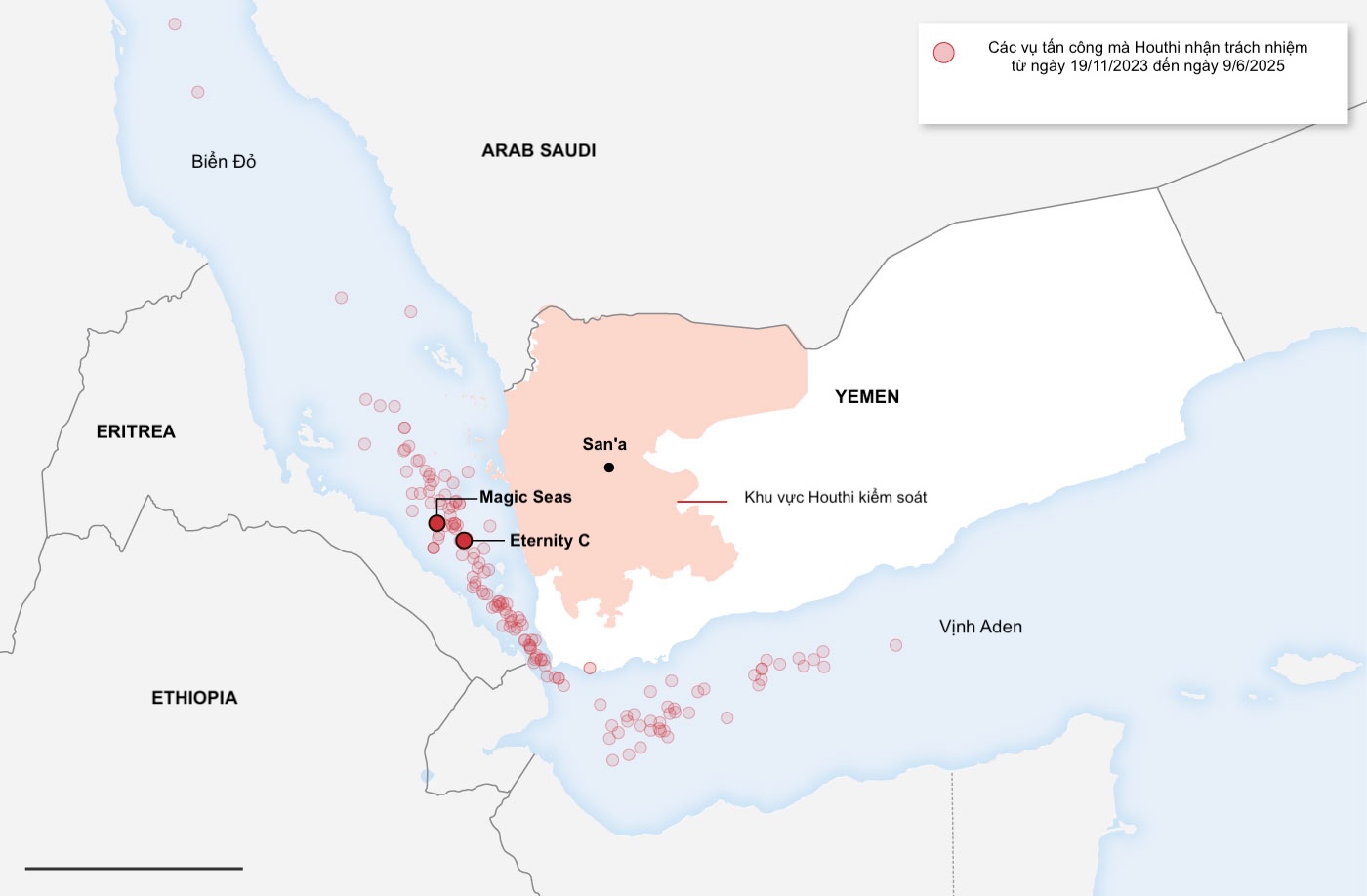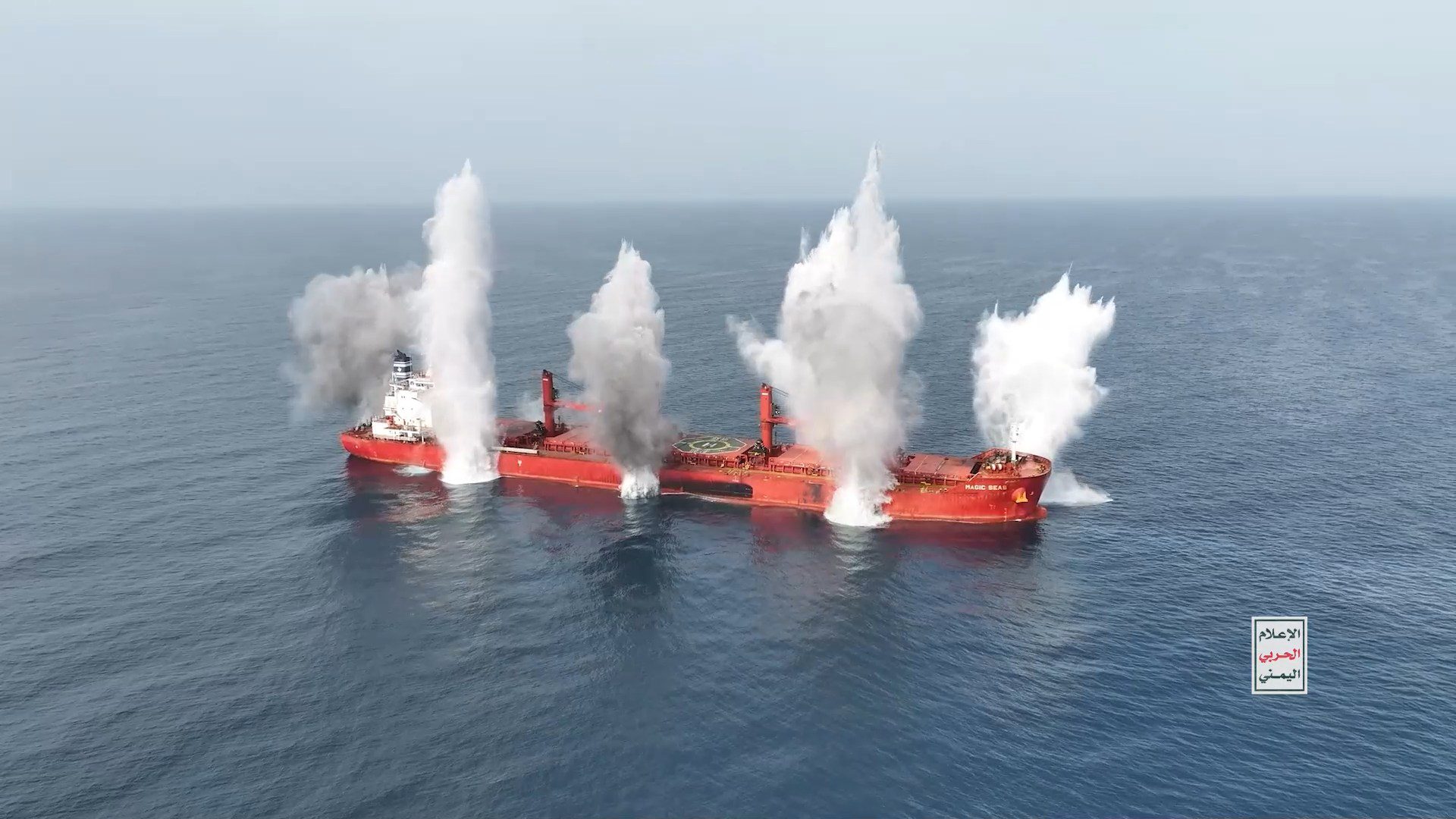The Houthi attacks began around midday on 6/7. The Liberian-flagged Magic Seas, loaded with fertilizer and steel, was en route to a port in Turkey, traversing the waters near Yemen.
According to a report from the UK Maritime Trade Operations (UKMTO), a unit coordinated by the US and UK navies to share security information with the maritime transport industry, security personnel aboard the Magic Seas issued a distress signal upon sighting approaching Houthi speedboats. They reported they were under attack.
Many cargo ships transiting the Red Sea have hired private security companies to deploy armed personnel since the Houthi rebels intensified attacks on vessels in the area. These guards are professionally trained but typically carry only personal rifles.
Four or five armed speedboats circled the large vessel before engaging in a firefight with the security team on the Magic Seas. The attackers then escalated the assault using grenade launchers, rockets, and unmanned aerial vehicles (UAVs).
Within 90 minutes, the attacking flotilla had grown to 7 or 8 boats. The security personnel shot down two UAVs, but two others, along with a rocket, struck the cargo hold. The engine room began to flood, leaving the crew with no choice but to abandon ship. The entire crew was rescued by a passing cargo ship and taken to Djibouti.
Video released by the Houthi rebels shows armed individuals boarding the Magic Seas after the crew abandoned it. They planted explosives around the hull, detonated them, and sank the vessel.
Mahdi al-Mashat, president of the Houthi Supreme Political Council, declared the group would continue attacking cargo ships linked to Israel until the Gaza conflict ended and restrictions on humanitarian aid to the region were lifted.
A day later, the Houthi rebels launched a new attack, less than 8 km from the Magic Seas incident. The target was the Eternity C, a Liberian-flagged cargo ship owned by Greece. The attack unfolded similarly.
The Eternity C, bound for Saudi Arabia, was surrounded by multiple armed speedboats. Onboard were 22 crew members, mostly Filipino, along with three armed security personnel: two Indians and a Greek captain.
Over the next two hours, sustained Houthi attacks with heavy weapons crippled the ship's engine systems and severely damaged the engine room.
In a recorded distress call, a crew member can be heard shouting, "Mayday, mayday, mayday, we are under attack," while pleading for immediate assistance.
 |
Locations of the attacks on the Magic Seas and Eternity C. Graphic: WSJ |
An officer with Cosmoship Management, the Eternity C's operator, said he desperately sought help from the UK navy and the European naval task force. However, he was informed there were no vessels in the area to provide support.
The three security personnel on the Eternity C fought back even as the Houthi rebels employed rockets and UAVs. A passing cargo ship attempted to assist but was blocked by a cordon established by the attackers.
The fighting continued from the evening of 7/7 into the next morning. When the Eternity C's security team ran out of ammunition, the crew was forced to abandon ship. The Houthi rebels then launched anti-ship missiles, sinking the Eternity C on the morning of 9/7.
Cosmoship immediately contacted a private company to launch a rescue effort. At the time of the attack, there were 25 people on board: 22 crew members and three security personnel. Ten were rescued at sea, but at least four died in the attack, and 11 remain missing.
The Houthi rebels claimed to have captured some of the Eternity C's crew. The US mission to Yemen also reported that sailors had been taken hostage and called for their swift release.
The security team captain was rescued after two days adrift at sea, thanks to a search effort by private security companies Diaplous and Ambrey. They had previously believed he had been captured.
Maritime security experts say these two attacks represent the most violent actions by the Houthi rebels since they began targeting ships in the Red Sea in November 2023. The group claims the attacks are in solidarity with Hamas and the Palestinian people in Gaza.
The Houthi rebels sank two ships and killed three sailors in an attack in March 2024, but these latest incidents raise greater concerns, both tactically and in terms of casualties.
"This is the most significant loss inflicted by the Houthi rebels in a 48-hour period," said Ellie Shafik, head of maritime intelligence at the UK digital solutions company Vanguard Tech.
The attacks come two months after US President Donald Trump announced a ceasefire with the Houthi rebels, which he claimed at the time would prevent attacks on shipping in the Red Sea. A senior US official said that as long as the Houthi rebels do not attack US ships, Washington considers the ceasefire to be in effect.
International efforts to protect shipping lanes in the Red Sea have become less effective recently, with fewer naval forces present to counter the Houthi rebels and their increasingly sophisticated weaponry, according to a senior US official.
The US, the UK, and the European Union's (EU) Aspides maritime security operation all confirmed they had no warships near the Magic Seas and Eternity C when the attacks occurred. The US has two aircraft carriers, the USS Nimitz and USS Carl Vinson, in the Middle East, but both were likely in the Arabian Sea at the time.
 |
The cargo ship Magic Seas moments before sinking. Photo: GCaptian |
Christopher Long, a former UK naval officer in the Middle East and current director of intelligence at maritime security firm Neptune P2P, said the lack of a substantial naval presence near Houthi-controlled areas in the southern Red Sea leaves cargo ships vulnerable. "You're on your own," he said.
Thuy Lam (According to WSJ, CNN, AP, The Guardian)












